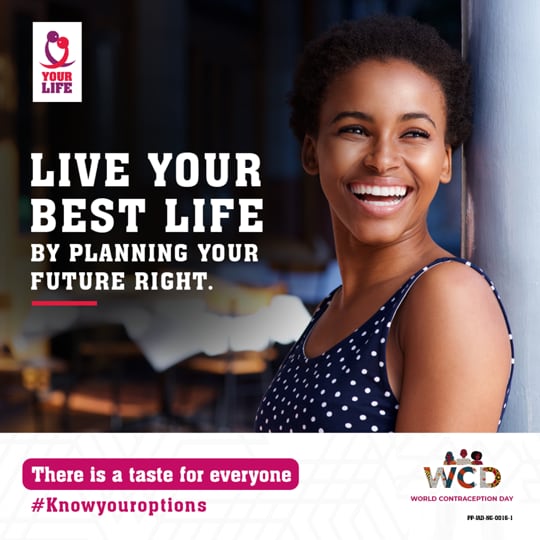"I want women to be able to choose how to plan their families"

Growing up between two continents and cultures and being a Public Health Pharmacist with a high intrinsic motivation for creating opportunities and freedom for girls and women: Naomi promotes sustainable family planning in West and Central Africa for Bayer. Here she shares insights into her day-to-day work in Côte d'Ivoire.
Naomi, where do you see huge challenges when it comes to family planning in West & Central Africa?
Teen pregnancies are a problem here. According to UNICEF, in 2019, one third of girls gave birth before the age of 19, and 6 percent before the age of 15 — this is the highest rate in the world! Reasons include a lack of reliable information about contraceptives, untrained healthcare professionals, some social norms not in favor of contraceptives, inadequate infrastructures and sometimes unavailability of products. Unfortunately, the corona crisis has reinforced these barriers in many respects with an estimated 1.4 million additional unintended pregnancies in low-and middle-incomes countries (LMIC) during 2020 (United Nations Population Fund, UNFPA). Saying that, I remain quite optimistic as in 13 countries in West and Central Africa (WCA) the number of modern contraceptive users has doubled since 2012! I’m so excited to know that never before had so many women and girls in LMIC had access to family planning!
Sounds like you are motivated! Would you tell me something about your personal journey and your work at Bayer?
Of course. I grew up between two continents and cultures, with an Ivoirian-Congolese mother and a Franco-Belgian-German father. After my pharmaceutical studies in eastern France I completed an International Master of Public Health in Paris with a focus on management of health systems in southern countries. After that, looking for where I could have a greater impact, I supported an NGO working to improve access to vaccinations across Africa, before joining Bayer just over a year ago. Here, I'm responsible for the coordination of the strategic fit between the Bayer Family Planning Sustainability agenda (see here) and the healthcare needs of the local governments and people in WCA.
My credo: I want women to be able to choose how to plan their families. I don't believe I am “helping” people and want to avoid falling into the trap of the savior complex. My contribution is just that I can guide some women to hold all the cards regarding their contraception. As a company we want to make "Science for a better life" accessible for people all over the world. I fully stand behind our purpose, always keeping in mind that, without falling into cultural relativism, it is up to each individual to decide what a "better life" means for him or her.
Which effects does contraception have on the life and role of women?
Not having the ability to plan and space childbirth can have a significant impact on mothers' lives trajectory, as it did for my own mother. She grew up in Côte d'Ivoire and had to drop out of school at 16 after getting pregnant. At my age she already had five children – not all of them planned. This shows: every girl and every woman, no matter where in the world she lives, should firstly have the opportunity to learn that life-changing modern contraceptives exist, and secondly, have the opportunity to access them.
Having contact with local women, I have learned about situations where contraception can even make the difference between life and death, for example, by preventing unsafe abortions. In addition to public health aspects, the impact of family planning on education and the economy is immense and well documented. Girls can complete school and women can continue to pursue their work, choose the time their births, and at best provide education for their children.
Modern family planning can therefore be a path to a more self-determined life. What does sustainability mean to you in general?
My role model and mentor in Bayer, Mildred Nadah Pita has shaped my understanding of sustainability. Thanks to her, every time I take a new action, I ask myself, what is the best way to ensure that it has a positive long-term impact, even after we are no longer there to monitor its effects. To do this, we work collaboratively with local women.
Thank you, Naomi!

#Knowyouroptions
Together with her colleague Willis Omondi Ogutu, Naomi coordinated a digital awareness campaign last year. The main goal was to bring the topic of contraception closer to young people in Nigeria. With 7,444,323 impressions and 131,330 interactions on social networks, numerous interested people were reached!










